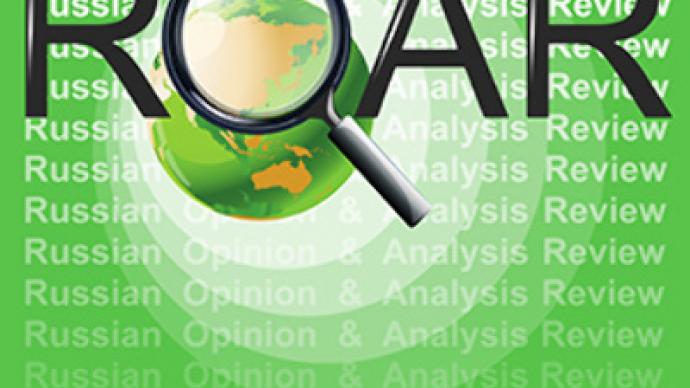ROAR: Kyrgyz president is “a hostage of his family”

As the opposition in Kyrgyzstan says it is in control of the country, analysts are predicting stronger resistance from the ruling regime than was seen during the 2005 Tulip Revolution.
Russian observers think that the same causes led to the current riots now as five years ago. “The current events in Kyrgyzstan are of internal nature,” believes Andrey Ryabov of the Carnegie Moscow Center. “Monopolization of practically all country’s resources by the family of President Kurmanbek Bakiyev, and the dominance of the Southern clans provoked enormous discontent among the more developed Northern regions and elites,” he told Vedomosti daily.
Kyrgyzstan does not play “a significant role in the post-Soviet space,” Ryabov said. But the country still attracts some international interest because it is situated near the important crossing of international borders, he added.
Compared to the neighboring states, Kyrgyzstan enjoys “a relatively high level of political pluralism, the openness of political system and the population’s activities,” the analyst added.
"Russia, the US, China and the European Union are interested in keeping political stability in the country and prevent it from falling into chaos that may give an opening to Islamic radicalism in the South," Ryabov said.
Whoever will get the power is a question of secondary importance, the analyst believes. It is clear they will represent the post-Soviet elite, who understand international issues well, he said.
"The regime has already been changed in Kyrgyzstan, Vremya Novostey daily said. Five years ago under similar circumstances, then-President Askar Akayev had to leave Kyrgyzstan, observer Arkady Dubnov said. But unlike the current authorities, Akayev “did not use force against raging crowds,” he stressed.
The authorities could have made a mistake detaining leaders of the opposition. Having lost them, “the crowd, furious, partly drunk, and seemingly uncontrolled by anyone, turned into a terrible force, sweeping away everything resembling the current authorities,” Dubnov said.
If the opposition leaders fail to come to an agreement with the officials who still remain in their positions, “the country may expect a terrific disaster,” the observer said. The traditional Kyrgyz method of solving issues may even lead to a civil war, he noted.
The relations between the elites are based on a clan principle, he added. The threat of the war may be real if clashes will continue between the South and the North of the country. The Bakiyev regime has supporters in the South.
Bakiyev, who came to power exactly five years ago, “has not understood what country he rules,” Dubnov said. “He has lost the support of most of the people who brought him to power.”
"At the same time, the leaders of the Kyrgyz opposition, most of whom are top officials, have also made a lot of mistakes,” the observer opined. "The main ones are constant addressing the crowd and ceaseless quarrels between themselves,” he stressed. “All this deprived the opposition of the chance to really oppose the usurpation of power by the Bakiyev family.”
The confrontation of the authorities and the opposition was not settled “in the framework of the parliament’s polemics and dialogue with the civil society,” and instead “has been forced out into the street,” the observer said.
The tragedy of the country is that the power has been seized “by an ambitious group with a weak head of family,” Dubnov said. Bakiyev has become “a hostage of his sons and brothers, and he was not able to counter their claims for power,” the observer added.
“Former revolutionary” Bakiyev himself is “absolutely guilty that he is being overthrown by his own people,” deputy director of the Institute of the Commonwealth States Vladimir Zharikhin said.
“Five years ago representatives of the South protested against the fact that the power had been seized by the Northern clan, and now the revolution begins from the North,” he told RBC daily.
“But financial flows are divided between the elites, and the people have not taken to the streets if utility tariffs for the poor population had not been increased twofold,” Zharikhin believes.
Akayev’s “sins” were also repeated when Bakiyev’s son Maksim “actually led all the processes in the economy and his brothers headed power structures,” the analyst noted.
However, unlike intelligent scientist Akayev, the current president will not abandon power easily, Zharikhin believes. “If the president and opposition do not come to an agreement, then the riots will be suppressed or the revolution – not a ‘velvet’ one – will win,” he believes.
Although the opposition has declared that it has taken over from Bakiyev, some analysts believe that the situation is not clear. The current regime is more solid than the previous one, believes Aleksey Vlasov, general director of the Center for the Study of Political Processes in the CIS.
At the same time, much will depend on the position of Russia, the US and China, the analyst told RIA Novosti news agency. The question is if Moscow, Washington or Beijing consider Bakiyev the guarantor of the stability in this Central Asian country, he said.
“It is very important because it will be difficult for the current Kyrgyz leadership to keep the situation under control without external support,” Vlasov said.
President Dmitry Medvedev stressed that the violence should be prevented. Moscow will follow the developments, he said, adding that “Kyrgyzstan has been and remains Russia's strategic partner.”
Prime Minister Vladimir Putin denied any Russian involvement in the Kyrgyz events. “Neither Russia, nor your humble servant, nor Russian officials have any relation to these events," Vladimir Putin said in Smolensk on April 7.
The Kyrgyz president Bakiyev “has repeated mistakes made by his predecessor, Askar Akayev,” Putin believes. Bakiyev criticized the previous leader for nepotism, bit it seems that the current leader “has fallen into the same trap,” Putin noted.
Putin had a telephone conversation on April 8 with opposition leader Roza Otunbaeva, who said her country needed economic aid from abroad.
The events in Kyrgyzstan are the country’s internal affair, but it still concerns Russia, believes State Duma deputy Konstantin Zatulin. The current clashes cancel the results of the 2005, he told Nezavisimya Gazeta daily.
Akayev lost power “with dignity,” and Russia granted asylum to him, the deputy said. Using force against discontented citizens, Bakiyev is losing his way for retreat and Moscow “will not give asylum to him if he loses power,” Zatulin added.
Russia wants the normalization of the situation in Kyrgyzstan, but it means dialogue rather than repressions, the deputy noted."The country is Russia’s ally in the CIS and in other regional structures, but its behavior has been ambiguous,” he said.
Sergey Borisov,
Russian Opinion and Analysis Review, RT













